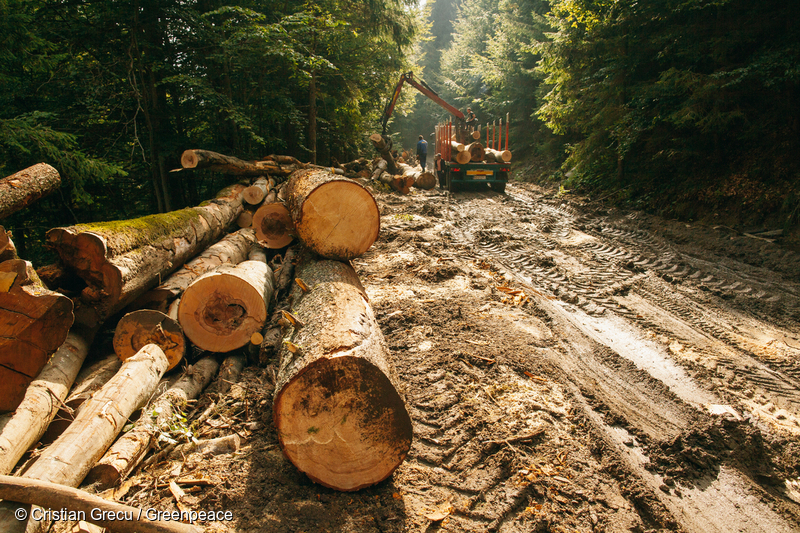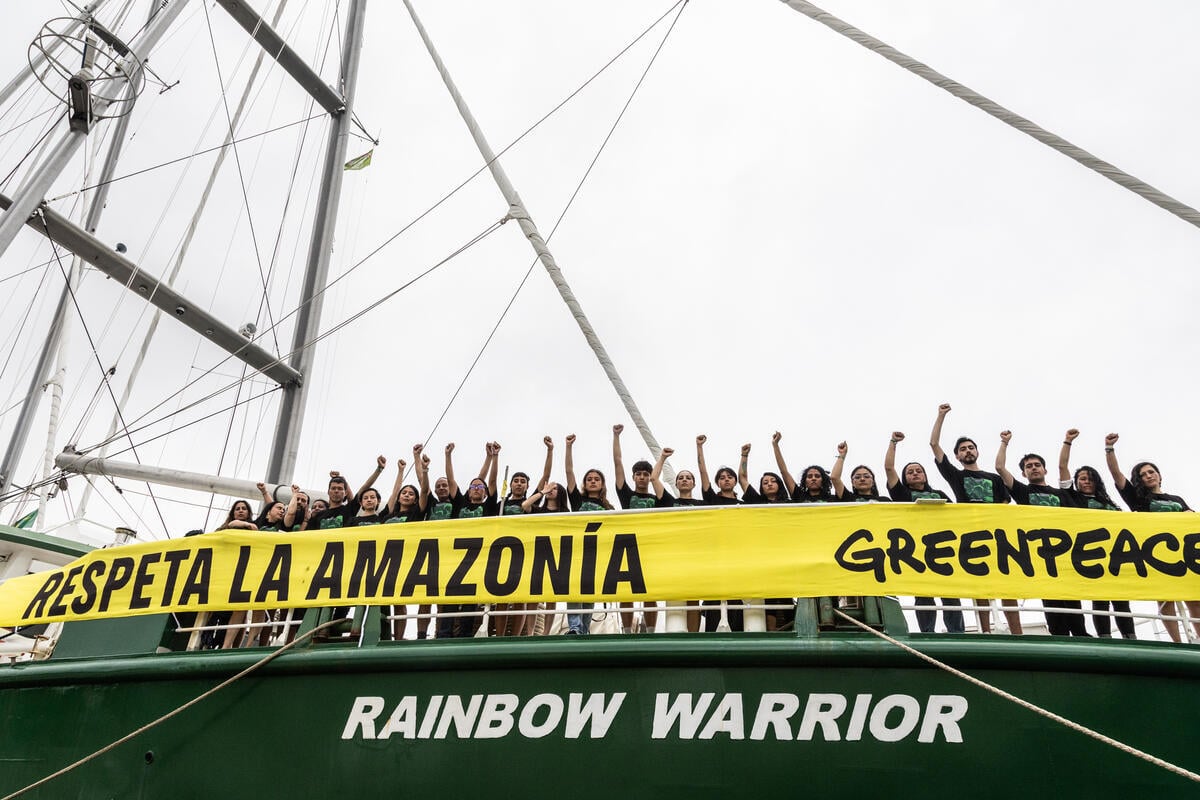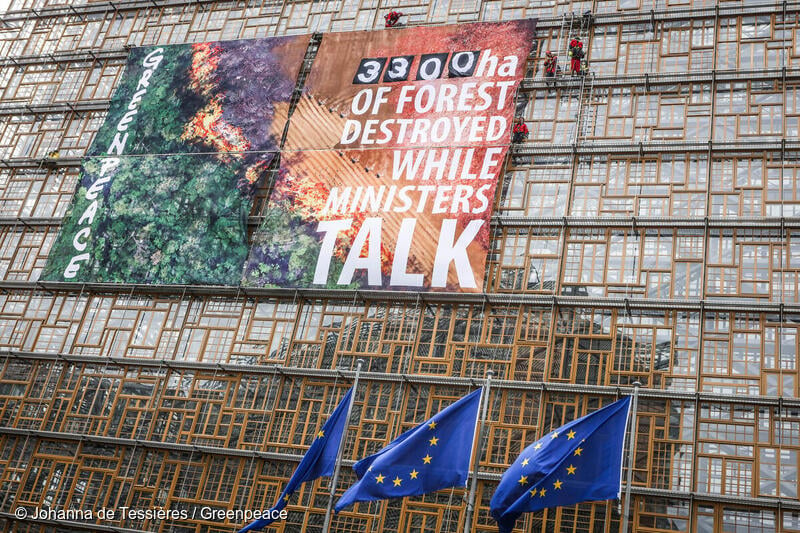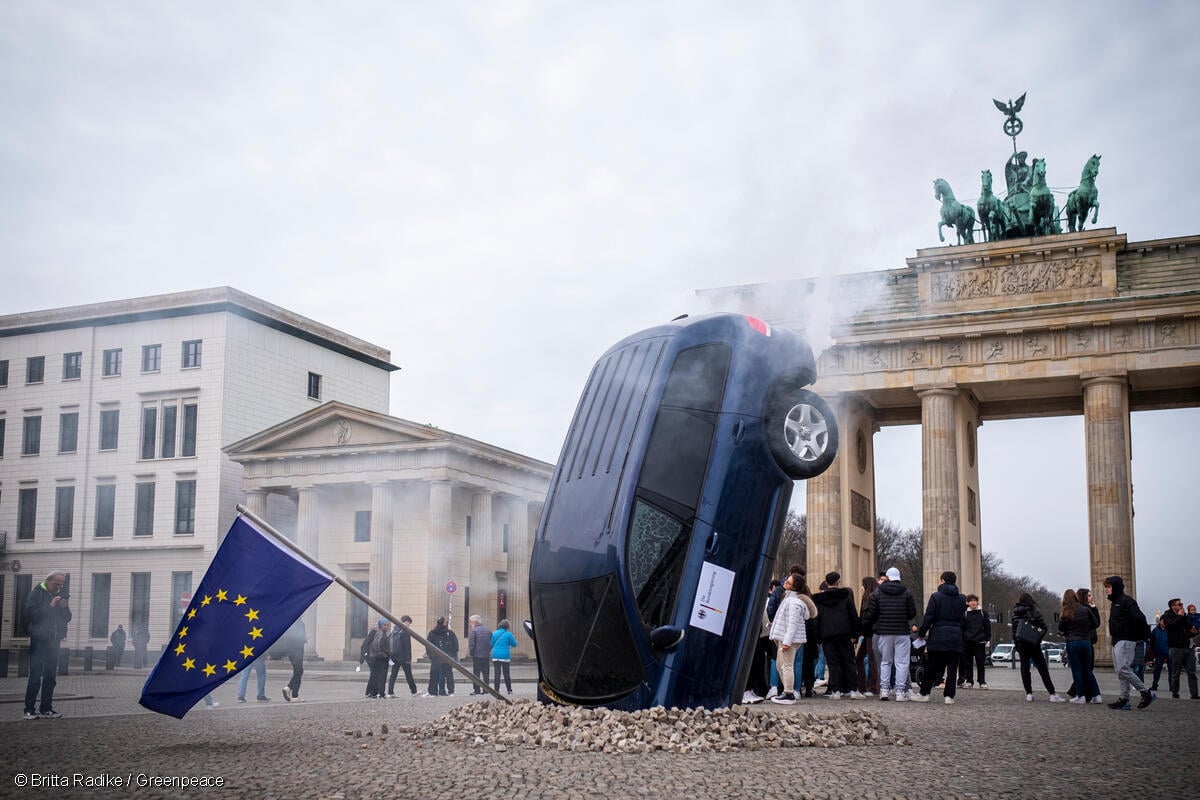Brussels, 11 December 2019 – The European Commission officially presented its plan for a European Green Deal today. Greenpeace warned that although the volume of policies is impressive and the promises are more significant than those of previous Commissions, the policies themselves are either too weak or still need to be pieced together.
Greenpeace EU spokesperson Franziska Achterberg said: “Ursula von der Leyen is promising the European Green Deal will tackle the runaway climate crisis and the massive destruction of nature. But the climate targets she’s proposing would be too little too late. On protecting nature, much is aspirational and needs to be fleshed out. The detailed measures that will follow must tackle the production and consumption patterns that have brought us to the brink. The climate, ecological and inequality crises require a fundamental rethink of the economic system that for decades has rewarded pollution, environmental destruction and human exploitation. We urge Commission President von der Leyen and her team to put forward legislation that is truly up to the task.”

On the 2030 EU emissions reduction target, Greenpeace EU spokesperson Franziska Achterberg said: “A 50-55 percent emission cut by 2030 is not sufficient. Nature doesn’t negotiate. The longer we wait to make the necessary changes in our economy, the more damage will be caused and the more difficult and expensive it will be. By delaying its proposal for the 2030 EU emissions reduction target to summer 2020, the Commission risks undermining the Paris agreement and any hope for EU climate leadership.”
The Commission stated that it will propose a new 2030 target by summer 2020. This would not leave enough time for EU governments to reach an agreement by the UN Climate Summit in Glasgow, where all parties to the Paris Agreement are due to present new, increased 2030 climate targets. It would cost the EU its already shaky international climate leadership and give other global players an excuse to delay too.
According to the European Environment Agency, the EU will not achieve sustainability “by continuing to promote economic growth and seeking to manage the environmental and social impacts.” It needs to rethink “not just technologies and production processes but also consumption patterns and ways of living”. It is for the Commission to fundamentally revamp the policies that make destructive products profitable.
An initial review of the European Green Deal by the Greenpeace European Unit shows some troublesome proposals:
- The proposed climate targets don’t match what science requires. Defining leadership as doing a bit more than the others will not suffice. Instead, the Commission’s action needs to be guided by science. Global greenhouse gas emissions need to halve by 2030, and reach net-zero by 2050. The EU has the obligation and ability to do a lot more than that. An EU GHG reduction of 50-55% by 2030 is insufficient, even to meet the 2°C target. To limit global warming to 1.5°C, the Commission should propose a reduction of at least 65% by 2030. Nature does not negotiate.
- Under the Paris Agreement governments must submit new or updated 2030 climate plans before the climate summit in 2020. Proposing proposing such a target in summer 2020 would make it very difficult for EU countries to agree on time and for the EU to inspire others. To ensure the EU leads on climate, the Commission should propose a new EU 2030 target within the first 100 days.
- An EU climate law must do more than simply enshrine the 2050 net-zero target in law. At the very least, it must ensure that all EU policies are consistent with the 1.5 degree target, allow citizens to take part in decision making and hasten the phase out of all fossil fuels in Europe. See our take of what the EU climate law must deliver.
- The Commission fails to recognise that all fossil fuels need to go, including oil and gas. “Decarbonising the gas sector” would enable polluting companies to lock in fossil fuel technology. Only a limited amount of non-fossil gas (methane) is available and should be reserved for industries that are most difficult to decarbonise. Energy should not be wasted on techno-fixes that benefit the largest polluters. Instead we need to move to 100% renewable energy as soon as possible.
- The Commission repeats the call to end fossil fuel subsidies, but the EU already committed ten years ago to end fossil fuel subsidies by 2025. So far however not a single EU government has spelled out a comprehensive plan to phase out fossil fuels. This Commission must ensure all subsidies are phased out. This includes capacity mechanisms – a type of controversial subsidy given to coal, gas and nuclear plants, supposedly to ensure electricity supply in case extra power is needed.
- The Commission Green Deal proposes a number of new financial tools including InvestEU and a Just Transition Fund to scale up finance for climate action. Given the Commission’s enchantment with end of pipe techno-fixes, there is a risk that these funds will support polluting industries and governments.
- The InvestEU fund will allocate at least 30% of funding to fighting climate change. The Commission must ensure that false solutions such as CCS, gas and nuclear are not supported through this fund.
- It will propose a Just Transition fund of up to 100bn euro. The money will be “linked to promoting a transition towards low-carbon and climate resilient activities”. Only governments with a coal and gas phase out plan should be eligible for funds.
- The Commission fails to acknowledge the urgent need to drastically reduce the consumption and production of animal products. This is alarming given the scientific evidence showing that we can meet climate and environmental targets only with a substantial reduction in the production and consumption of livestock products, particularly meat.
- The Commission recognises the need to reduce the use of pesticides, fertilisers and antibiotics but shows no clear political ambition at this stage.
- With rampant deforestation continuing globally, limiting efforts to “promoting” products that do not involve deforestation and forest degradation is completely inadequate. It is also a major step back from the Commission’s earlier commitments to take action that “minimis[es] the risk of deforestation and forest degradation associated with commodity imports in the EU”. European consumers do not want to be complicit in forest destruction and human rights violations driven by our consumption of products like soy, beef and palm oil and Commission should propose new legislation that guarantees this.
- The objective of “effective afforestation” under the EU Forest Strategy and links to bioeconomy risks promoting monoculture tree plantations that mostly serve the needs of forest industries and destroy nature. The focus should be on restoration of natural ecosystems as a part of the EU’s upcoming Biodiversity Strategy.
- While there is an aim to shift road freight to rail, there is a lack of ambition to connect Europe by rail for passenger transport in order to provide a viable alternative to flights, especially short hauls, and car travel.
- The Commission wants to propose a “new set of air pollutant emissions standards” instead of going straight for zero emissions vehicles – ending the sales of combustion engine (diesel and petrol) cars by 2025.
- Last, but certainly not least, the Commission has said the Green Deal “is a new growth strategy”. But just last week the European Environment Agency (EEA) warned that the pursuit of growth is incompatible with environmental protection. It called for fundamental changes to “the core systems that shape the European economy and modern social life – especially the energy, mobility, housing and food systems”. The Commission’s policies should be guided by a true paradigm shift in these systems, supported by a rethink of the financial system and efforts to downscale economic production and consumption.
Contacts:
Franziska Achterberg – Greenpeace European Green Deal spokesperson: +32 (0) 498 36 24 03, [email protected]
Sebastian Mang – Greenpeace EU climate policy adviser: +32 (0)479 601289, [email protected]
Greenpeace EU press desk: +32 2 274 1911, [email protected]
For breaking news and comment on EU affairs: www.twitter.com/GreenpeaceEU
Greenpeace is an independent global campaigning network that acts to change attitudes and behaviour, to protect and conserve the environment and to promote peace. Greenpeace does not accept donations from governments, the EU, businesses or political parties.



